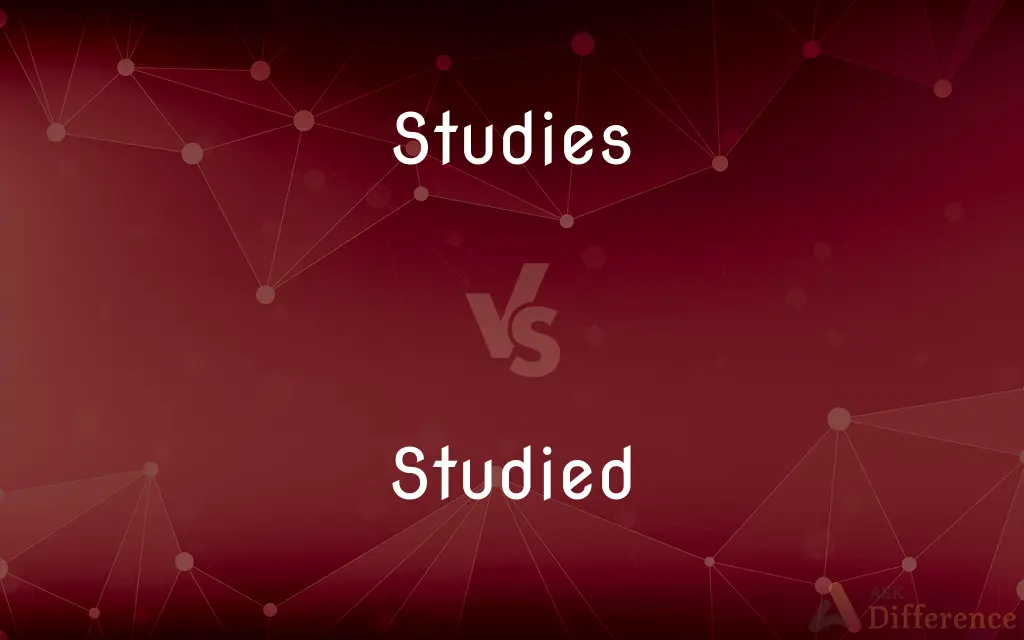Studies vs. Studied — What's the Difference?
By Urooj Arif & Fiza Rafique — Updated on February 28, 2024
"Studies" refers to academic courses or research activities, emphasizing ongoing, plural aspects of learning and investigation. "Studied" is the past tense or past participle of the verb "study," indicating the action of learning or examining something.

Difference Between Studies and Studied
Table of Contents
ADVERTISEMENT
Key Differences
"Studies" often denotes a field of academic inquiry or specific educational activities. It can imply either the act of engaging in these activities or the subjects themselves, as in "My studies focus on marine biology". The term highlights the continuous or multiple nature of these endeavors, covering everything from individual courses to entire academic careers.
The term studies highlights the continuous or multiple nature of these endeavors, covering everything from individual courses to entire academic careers. The term studied, "I studied French in college" suggests that the speaker learned French during their college years, but the action is now complete.
"Studies" can also suggest a broad area of academic work or research fields, "studied" is more about the methodical approach to acquiring knowledge or information on a particular subject. "Studied" can also imply a deliberate, careful consideration of a topic, as in "He studied the problem carefully before responding."
The distinction also extends to their grammatical roles: "studies" serves as a noun (when referring to academic subjects or research areas) or a present tense verb (when describing the act of studying), whereas "studied" functions as a verb in the past tense or past participle form. This difference underscores the temporal or functional separation between ongoing academic endeavors and completed actions of learning or investigation.
Comparison Chart
Definition
Refers to academic or research activities, or the subjects of such activities.
The past tense or past participle of "study," indicating past action.
ADVERTISEMENT
Usage
Denotes ongoing or plural aspects of learning or investigation.
Indicates completed learning or examination actions.
Example Context
"She is continuing her studies in psychology."
"He studied the effects of climate change for his thesis."
Grammatical Role
Noun (for subjects) or present tense verb (for the act of studying).
Verb (past tense or past participle form).
Implication
Emphasizes a continuous or broad scope of academic work.
Suggests a specific, concluded effort of learning or examining.
Compare with Definitions
Studies
Used to describe ongoing educational efforts.
She is continuing her studies next semester.
Studied
Past action of academic engagement.
We studied together for the finals last year.
Studies
The act of engaging in academic work.
His studies take up most of his time.
Studied
Learned or examined something in the past.
I studied the historical documents for my report.
Studies
Areas of scholarly investigation.
Environmental studies have become increasingly important.
Studied
Past participle used in passive constructions.
The phenomenon was studied extensively by the team.
Studies
Plural form when referring to multiple subjects.
Her studies include mathematics, science, and literature.
Studied
Indicates deliberate, careful examination.
He studied the painting for hours.
Studies
Academic courses or research activities.
Her studies at the university are focused on renewable energy.
Studied
Reflects completed research.
She studied the effects of pollution on marine life for her dissertation.
Studies
The effort to acquire knowledge, as by reading, observation, or research
The study of language has overturned many misconceptions.
Studied
Learned; knowledgeable.
Studies
An act or effort made in the pursuit of knowledge
Applied himself to his studies.
Studied
Simple past tense and past participle of study
Studies
Attentive examination or analysis
The new drug is still under study.
Studied
Practiced; self-conscious; careful.
She gave a studied reply.
Studies
A detailed examination, analysis, or experiment investigating a subject or phenomenon
Conducted a study of children's reading habits.
Studied
Closely examined; read with diligence and attention; made the subject of study; well considered; as, a studied lesson.
Studies
A noteworthy or interesting example
He is a study in contradictions.
Studies
To apply oneself to learning, especially by reading
Studied for the exam.
Studies
(plural only) An academic field of study concerning the given subject.
My boyfriend is taking media studies.
Common Curiosities
Is "studied" only used in academic contexts?
Primarily, but it can also refer to the careful examination of any subject, not just academic learning.
How do "studies" and "studied" relate to lifelong learning?
"Studies" can embody the ongoing process of lifelong learning, while "studied" might mark specific phases or achievements within that lifelong journey.
Can "studies" refer to professional work as well as academic?
While primarily academic, "studies" can extend to professional research or investigation in a field of expertise.
Can "studies" be used to describe a single course?
Yes, though it often implies a broader educational context, "studies" can refer to singular courses, especially when specifying a field of study.
How does the use of "studies" or "studied" affect the perception of an academic resume?
"Studies" suggests ongoing engagement and breadth, potentially adding dynamism. "Studied" may highlight completed qualifications or specific focuses, offering depth.
How do "studies" and "studied" contribute to academic discourse?
They allow for nuanced descriptions of educational processes, distinguishing between ongoing endeavors and completed actions or phases of learning.
Does "studied" imply success or mastery of the subject?
Not necessarily; it indicates engagement with the subject but does not inherently convey the level of comprehension or mastery achieved.
In what context might "studied" not refer to past actions?
When used as a past participle in passive constructions, "studied" describes actions done to the subject, not necessarily indicating when.
Can "studies" and "studied" be used interchangeably?
No, due to their different grammatical roles and temporal implications, they serve distinct functions in language.
Can the term "studies" apply to informal learning?
While it typically connotes formal academic work, "studies" can be loosely used to describe any organized effort to learn or investigate a subject.
Share Your Discovery

Previous Comparison
Help vs. Hinder
Next Comparison
Abut vs. AdjoinAuthor Spotlight
Written by
Urooj ArifUrooj is a skilled content writer at Ask Difference, known for her exceptional ability to simplify complex topics into engaging and informative content. With a passion for research and a flair for clear, concise writing, she consistently delivers articles that resonate with our diverse audience.
Co-written by
Fiza RafiqueFiza Rafique is a skilled content writer at AskDifference.com, where she meticulously refines and enhances written pieces. Drawing from her vast editorial expertise, Fiza ensures clarity, accuracy, and precision in every article. Passionate about language, she continually seeks to elevate the quality of content for readers worldwide.














































